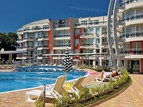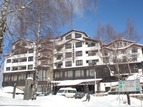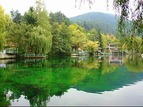The 105 charms of Bulgaria
Sofia Echo, 09.11.2009
 Two seasons best suit the publishing of a new book: early autumn, and mid-spring. Or so explains Lubomir Popiordanov, a founder and the current chairman of the Bulgarian Association for Alternative Tourism, and the publisher of BAAT’s rural tourism guide, now in its fifth edition.
But why these two times of year? Popiordanov says that that is when people start planning ahead for their holidays (though one might also think that with such an alluring handbook, one would want to browse through it daily, if only to take a mental holiday to the countryside from the bustle of the city).
This edition of the B&B and Adventure Guidebook, released on September 24 2009, is a change from the previous volumes in that it includes more background and descriptions of the different regions of the country, and in that the format is smaller: the current size is perfect to slip into a purse, or to tuck into a cargo pocket.
Along with providing maps and contact information for small family hotels, beds and breakfasts, and guesthouses, the book now includes details on sights and places of interest, nature parks, activities like horseback riding and rock climbing, and, a special initiative of BAAT, places of accommodation that fulfil Green Lodge (Зелена къща) criteria.
Two seasons best suit the publishing of a new book: early autumn, and mid-spring. Or so explains Lubomir Popiordanov, a founder and the current chairman of the Bulgarian Association for Alternative Tourism, and the publisher of BAAT’s rural tourism guide, now in its fifth edition.
But why these two times of year? Popiordanov says that that is when people start planning ahead for their holidays (though one might also think that with such an alluring handbook, one would want to browse through it daily, if only to take a mental holiday to the countryside from the bustle of the city).
This edition of the B&B and Adventure Guidebook, released on September 24 2009, is a change from the previous volumes in that it includes more background and descriptions of the different regions of the country, and in that the format is smaller: the current size is perfect to slip into a purse, or to tuck into a cargo pocket.
Along with providing maps and contact information for small family hotels, beds and breakfasts, and guesthouses, the book now includes details on sights and places of interest, nature parks, activities like horseback riding and rock climbing, and, a special initiative of BAAT, places of accommodation that fulfil Green Lodge (Зелена къща) criteria.
 Green Lodge was created in 2008 as a means to recognise and certify lodgings in Bulgaria that meet ECEAT (European Centre for Ecological and Agricultural Tourism) criteria for responsible use of water and electricity, waste management, providing guests with information about the region and what they can do to help preserve its inherent cultural and natural state, contribution to local economy, respect for the environment, and level of security and comfort of the place of accommodation.
At a press conference on September 24 at Bulgarian news agency BTA, Popiordanov presented the fruits of more than one year’s work by BAAT. The bilingual Bulgarian-English guidebook, which, along with being a useful tool to travellers from here and abroad, also has the goal of helping the locals in a given location to realise that "their lives, culture and traditions are meaningful", he said. "It is a continuation of our organisation’s 20 years of existence."
An overwhelming advocate for the successful future of Bulgaria being founded in tourism opportunities that will benefit – as opposed to destroy – the country in the years to come, Popiordanov said that "the message of the guidebook is to travel in a responsible manner, to try to respect nature and local and national heritage. This is something that our clients must recognise, and that our hosts can help further by teaching our clients to travel responsibly".
While Bulgaria possessed "all the beauties of Europe", its resources were not endless, something Popiordanov highlighted with the examples of recent over-construction on the Black Sea coast, with numerous half-completed and half-empty mountain resorts.
"We want to create a new way in which Bulgarians travel well," he said.
And this is being seen. Particularly as concerns the Green Lodge, BAAT has found that people support the initiative all around the country – and not only in typical tourist destinations like Rila Mountain or the Rhodopes. In fact, the top awardee of the 2008 recognition was in a guesthouse in Sliven, a smaller city with nothing remarkable about, it in south-eastern Bulgaria.
Green Lodge was created in 2008 as a means to recognise and certify lodgings in Bulgaria that meet ECEAT (European Centre for Ecological and Agricultural Tourism) criteria for responsible use of water and electricity, waste management, providing guests with information about the region and what they can do to help preserve its inherent cultural and natural state, contribution to local economy, respect for the environment, and level of security and comfort of the place of accommodation.
At a press conference on September 24 at Bulgarian news agency BTA, Popiordanov presented the fruits of more than one year’s work by BAAT. The bilingual Bulgarian-English guidebook, which, along with being a useful tool to travellers from here and abroad, also has the goal of helping the locals in a given location to realise that "their lives, culture and traditions are meaningful", he said. "It is a continuation of our organisation’s 20 years of existence."
An overwhelming advocate for the successful future of Bulgaria being founded in tourism opportunities that will benefit – as opposed to destroy – the country in the years to come, Popiordanov said that "the message of the guidebook is to travel in a responsible manner, to try to respect nature and local and national heritage. This is something that our clients must recognise, and that our hosts can help further by teaching our clients to travel responsibly".
While Bulgaria possessed "all the beauties of Europe", its resources were not endless, something Popiordanov highlighted with the examples of recent over-construction on the Black Sea coast, with numerous half-completed and half-empty mountain resorts.
"We want to create a new way in which Bulgarians travel well," he said.
And this is being seen. Particularly as concerns the Green Lodge, BAAT has found that people support the initiative all around the country – and not only in typical tourist destinations like Rila Mountain or the Rhodopes. In fact, the top awardee of the 2008 recognition was in a guesthouse in Sliven, a smaller city with nothing remarkable about, it in south-eastern Bulgaria.
 The current picture of village tourism in Bulgaria is like a 1960s snapshot of a family picnic – lively, colourful, a bit chaotic and in places unfocused. This, again, is something which BAAT is working to improve, in part through the Green Lodge programme, which puts in place a standard to attain. "We saw, in our Green Lodge journeys (for evaluation of each site), that in Bulgaria there are places that surpass, or at least are at the level of, what is offered in Europe," Popiordanov said.
On the other hand, of the what he estimates to be 800 to 1000 guesthouses in the country, only 21 received official recognition for sustainable, comfortable tourism amenities.
The benefit of village tourism, he said, was that it was not limited by season or location, something particularly favourable for limiting carbon emissions caused by transport: there is no need to go from Sofia all the way across the country to Strandja or Sakar to get that real village experience. Popiordanov also encouraged travellers to use, where possible, train or bike.
"Bulgarian tourism must first be about the people, not beds and sheets," he said, in response to the current state of the country’s tourism industry. "We need real management of Bulgarian tourism, and in a sustainable way. We must win the confidence of tourists."
For further information about BAAT and the B&B and Adventure Guidebook, please visit BAAT.
The current picture of village tourism in Bulgaria is like a 1960s snapshot of a family picnic – lively, colourful, a bit chaotic and in places unfocused. This, again, is something which BAAT is working to improve, in part through the Green Lodge programme, which puts in place a standard to attain. "We saw, in our Green Lodge journeys (for evaluation of each site), that in Bulgaria there are places that surpass, or at least are at the level of, what is offered in Europe," Popiordanov said.
On the other hand, of the what he estimates to be 800 to 1000 guesthouses in the country, only 21 received official recognition for sustainable, comfortable tourism amenities.
The benefit of village tourism, he said, was that it was not limited by season or location, something particularly favourable for limiting carbon emissions caused by transport: there is no need to go from Sofia all the way across the country to Strandja or Sakar to get that real village experience. Popiordanov also encouraged travellers to use, where possible, train or bike.
"Bulgarian tourism must first be about the people, not beds and sheets," he said, in response to the current state of the country’s tourism industry. "We need real management of Bulgarian tourism, and in a sustainable way. We must win the confidence of tourists."
For further information about BAAT and the B&B and Adventure Guidebook, please visit BAAT.
 Member of:
Member of:



























 Touroperator
Touroperator
